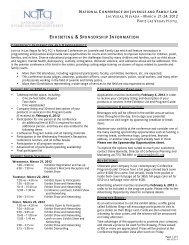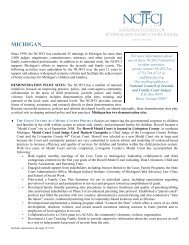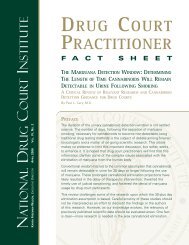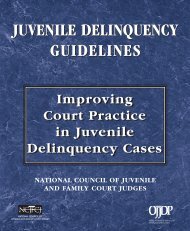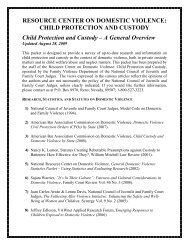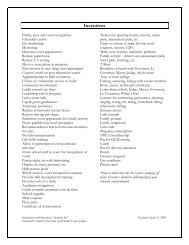dowNload - National Council of Juvenile and Family Court Judges
dowNload - National Council of Juvenile and Family Court Judges
dowNload - National Council of Juvenile and Family Court Judges
You also want an ePaper? Increase the reach of your titles
YUMPU automatically turns print PDFs into web optimized ePapers that Google loves.
(Easy) Steps<br />
to Creating a<br />
Transition Policy<br />
for <strong>Juvenile</strong><br />
Drug <strong>Court</strong><br />
Team Members<br />
By Wendy L. Schiller, Project Coordinator, NCJFCJ<br />
<strong>Juvenile</strong> Drug <strong>Court</strong> (JDC) pr<strong>of</strong>essionals are innovated, dedicated<br />
pr<strong>of</strong>essionals who <strong>of</strong>ten get promoted, are appointed to work in other<br />
areas <strong>of</strong> the court, or find new career paths. For this reason there<br />
is a substantial amount <strong>of</strong> turnover among JDC team members. In<br />
some cases, there may just be burn-out, as working on a JDC team is<br />
extremely dem<strong>and</strong>ing. Because this issue permeates most jurisdictions<br />
that have a JDC program, it is important to implement a process to<br />
“transition” new team members onto the existing drug court team.<br />
Keep the transition plans simple; focus on 1) what do new team<br />
members need to know <strong>and</strong> 2) what is the best way for new team<br />
members to learn about their role on the JDC.<br />
Below are some tips or strategies that will assist teams in creating a<br />
well-thought out transition policy for new JDC team members, as well<br />
as for the youth <strong>and</strong> families they serve:<br />
1. Create “Learning Packets”<br />
A JDC program should have several “Learning Packets” on h<strong>and</strong> to<br />
give to new <strong>and</strong> incoming team members. These packets can serve as<br />
training materials because it is extremely important for team members<br />
who have not worked with adolescents or in the juvenile drug court<br />
field to engage in some “pre-work” before joining the team <strong>and</strong> working<br />
with the youth <strong>and</strong> families. This packet should include a current<br />
list <strong>of</strong> contact information for stakeholders <strong>and</strong> team members, an<br />
updated community partnership map, a current participant guide, <strong>and</strong><br />
a current policy <strong>and</strong> procedure manual. In addition, there are several<br />
publications which will help new team members better underst<strong>and</strong> the<br />
philosophy behind juvenile drug courts, as well as adolescent development,<br />
<strong>and</strong> ways to further comprehend this population. Below is a list<br />
<strong>of</strong> resources that would be helpful to add to the Learning Packet:<br />
• The <strong>Juvenile</strong> Drug <strong>Court</strong> Strategies in Practice<br />
• Managing <strong>and</strong> Sustaining Your <strong>Juvenile</strong> Drug <strong>Court</strong><br />
• Ensuring Fidelity to the 16 Strategies in Practice<br />
• Using “Sober Support” Groups in Your <strong>Juvenile</strong> <strong>Court</strong><br />
• Exploring the Evidence: The Value <strong>of</strong> <strong>Juvenile</strong> Drug <strong>Court</strong>s<br />
• Seven Things <strong>Juvenile</strong> <strong>Court</strong>s Should Know About Learning<br />
Disabilities<br />
• Ten Things Every <strong>Juvenile</strong> <strong>Court</strong> Judge Should Know About<br />
Trauma <strong>and</strong> Delinquency<br />
All <strong>of</strong> these publications are housed <strong>and</strong> can be downloaded from<br />
the <strong>Juvenile</strong> Drug <strong>Court</strong> Information Center, located on the NCJFCJ’s<br />
website at: http://www.ncjfcj.org/our-work/juvenile-drug-courts.<br />
2. Shadow existing team members<br />
Teams should make a concerted effort to give incoming members an<br />
opportunity to work with the outgoing member to get a good “feel”<br />
for the position <strong>and</strong> what their role will be on the team. Consider<br />
drafting a checklist (these should be role-dependent) <strong>of</strong> duties or<br />
information that should be conveyed during the day so nothing is<br />
forgotten or accidentally skipped. See example checklist for a new JDC<br />
coordinator below:<br />
JDC Coordinator Checklist<br />
l Review incentives <strong>and</strong> sanction tracking procedure<br />
l Review file sharing procedure<br />
l Review pre-court staffing structure<br />
22 JUVENILE AND FAMILY JUSTICE TODAY | WINTER 2013




